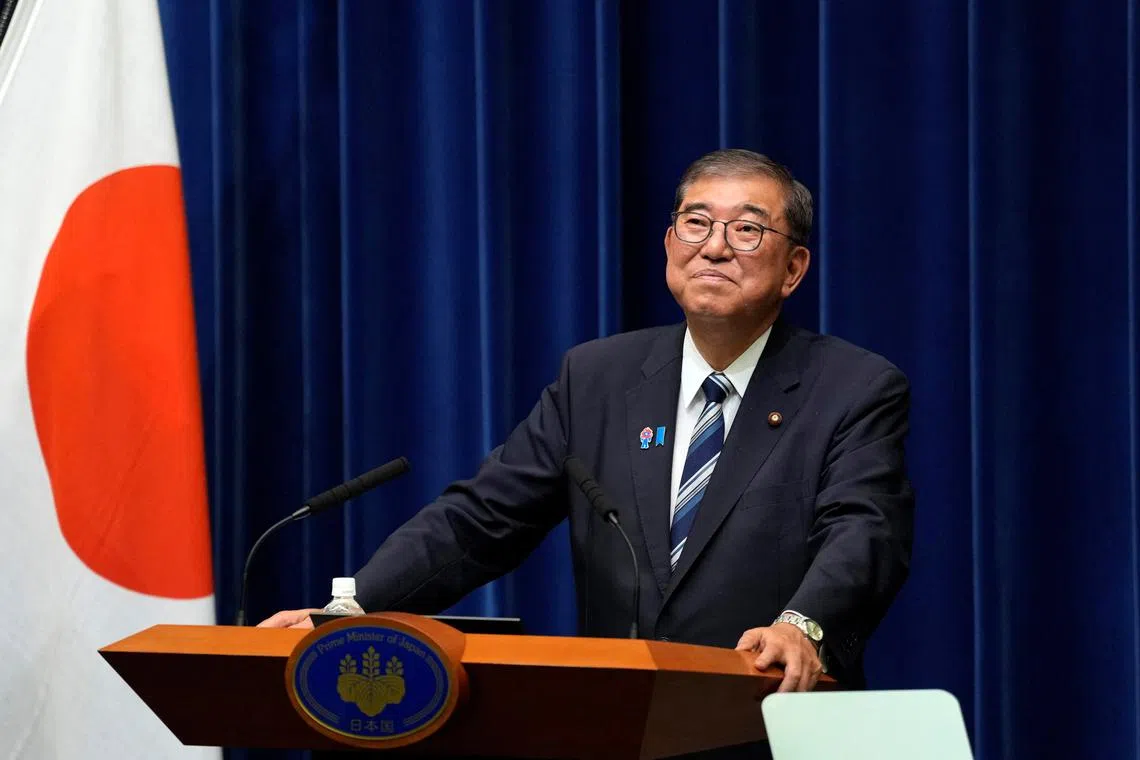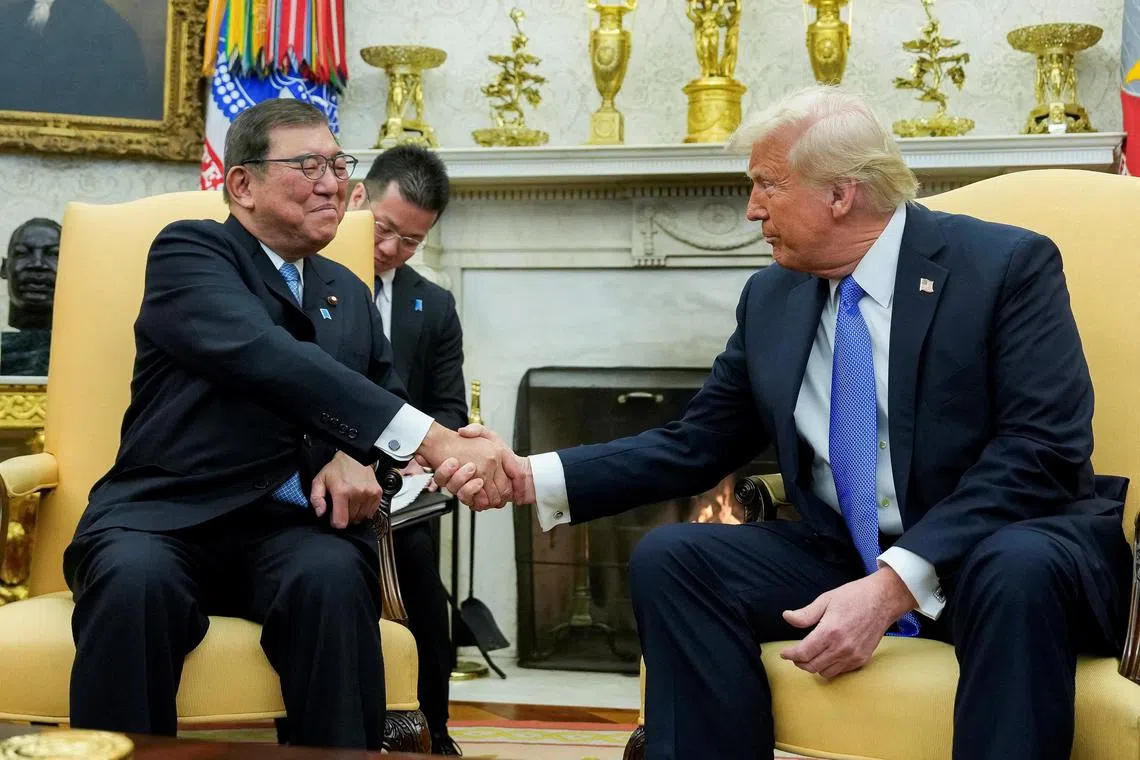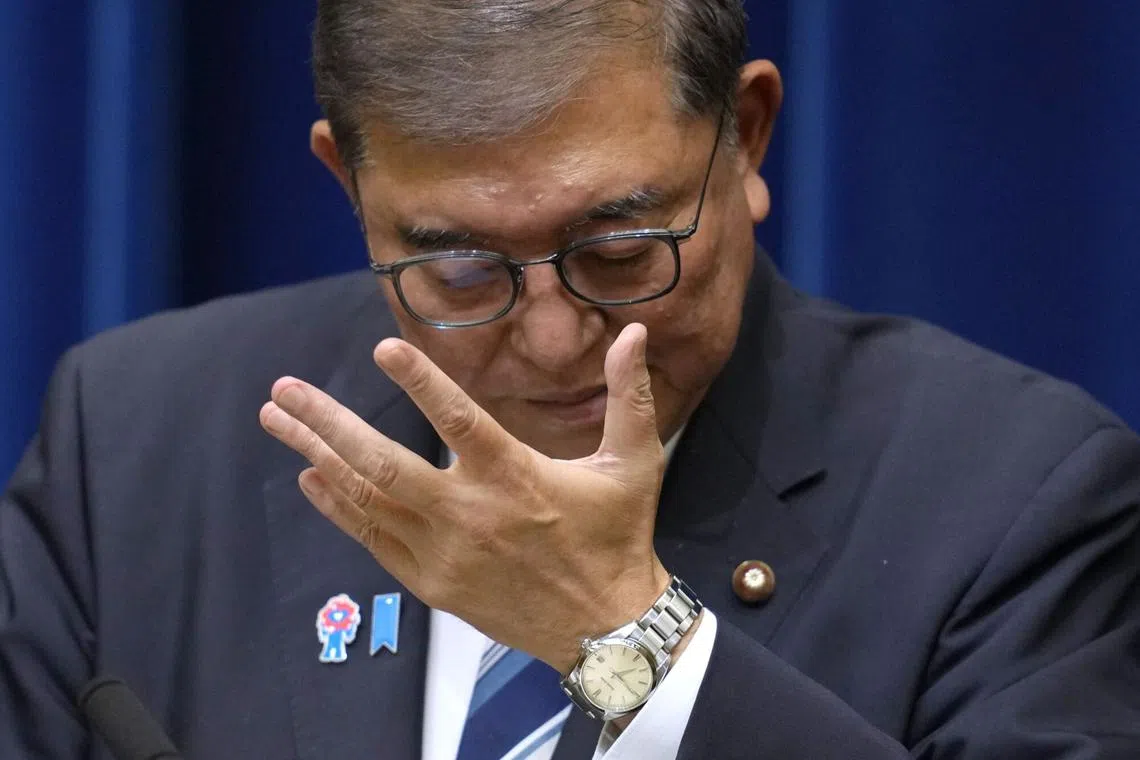‘Appropriate time to step down’: Japan PM Ishiba resigns after electoral blows for ruling LDP
Sign up now: Get insights on Asia's fast-moving developments

Japanese Prime Minister Shigeru Ishiba announced his resignation at a press conference in Tokyo on Sept 7.
PHOTO: REUTERS
- Prime Minister Ishiba resigned to prevent internal conflict within the LDP, apologising for his decision after poor election results amid pressure from rivals.
- Despite public support and policy achievements like low-income support, Ishiba's minority government faced LDP discontent, triggering a potential leadership challenge.
- Ishiba hopes for LDP unity and reform, cautioning against populism, with Koizumi and Takaichi emerging as potential successors for his remaining term.
AI generated
TOKYO – Defiant but finding himself increasingly isolated within the ruling Liberal Democratic Party (LDP), Japanese Prime Minister Shigeru Ishiba said on Sept 7 that he was calling time on a short-lived tenure.
Mr Ishiba, who took office on Oct 1, 2024, will remain as prime minister until the LDP picks a successor.
Bowing in apology and appearing to blink back tears, the 68-year-old leader admitted he had come to a difficult decision that he felt was necessary to stave off a brewing civil war within the party.
“I am deeply sorry to the public for having to step down this way,” he told a 50-minute nationally televised news conference. “I will devote all my heart and soul during my remaining time to tackling policy issues.”
His resignation follows a “turning point” after US President Donald Trump signed off on an executive order
“I have always said that I am not attached to my position, and that I will make a decision (on my future) at the appropriate time,” he said.
“As LDP president, I bear responsibility for the election results. Now that negotiations regarding US tariff measures have reached a conclusion, I believe that this is the appropriate time to step down.”

Mr Shigeru Ishiba with US President Donald Trump at the White House in Washington on Feb 7.
PHOTO: REUTERS
Mr Ishiba’s position had looked increasingly untenable with his arch-rivals within the LDP, such as former prime minister Taro Aso, 84, openly agitating for his ouster.
A long-time outsider and vocal gadfly on the LDP’s fringes, Mr Ishiba defied expectations to take office on his fifth bid
However, he faced a tall order from day one, hampered by the small size of his coterie of trusted allies and the party’s deeply entrenched vested interests that clashed with reform ideals.
Compounding this were societal woes such as runaway rice prices inflation foreigners
As a result, Mr Ishiba presided over three straight electoral drubbings for the LDP: the Lower House election in October 2024, a Tokyo Metropolitan Assembly poll in June 2025, and then an Upper House election
This means that the LDP now leads a minority government with coalition partner Komeito, and requires the cooperation of other opposition parties to pass legislation in the Diet.
The LDP’s humbling in the Upper House polls on July 20 plunged Japanese politics into unprecedented confusion. While LDP leaders historically resigned quickly in ignominy under such circumstances, Mr Ishiba was adamant that the party’s woes were not entirely his doing.
He also cited critical policy priorities, including the US trade deal and the need to respectfully observe the 80th anniversary of World War II African leaders South Korean President Lee Jae Myung Indian Prime Minister Narendra Modi
Despite a surprising U-turn in public sentiment in August, with media surveys unanimously showing more Japanese favoured Mr Ishiba staying than quitting, he was nonetheless living on borrowed time.
These polls failed to quell disquiet within the LDP as his opponents bayed for accountability, triggering a party clause that would force an unprecedented extraordinary party leadership election if a majority of elected lawmakers and prefectural representatives were in support.
The deadline for that petition was Sept 8.

Japanese Prime Minister Shigeru Ishiba bowed in apology and appeared to blink back tears during the press conference in Tokyo on Sept 7.
PHOTO: BLOOMBERG
“We have yet to dispel the public’s distrust of politics. This is my greatest regret and the LDP must draw a line under this,” Mr Ishiba said.
“The LDP must be a conservative party that values tolerance and inclusion, and must truly be a people’s party. If we lose trust, Japanese politics would fall prey to easy populism. I increasingly fear this.”
He said that while his work was not done, he chose to step down to avoid creating an irreparable chasm within the party.
“I hope the LDP can unite to overcome the difficult situation, change public perceptions that it is an old party and achieve a fundamental rebirth,” he said.
Mr Ishiba expressed gratitude for the public who urged him to stay on, and admitted to having considered a high-stakes snap national election instead to redress the gap between party sentiment and public opinion.
But doing so, he said, would only worsen party disunity and offered no certainty of victory.
During the press conference, he recounted his administration’s achievements in the past year, including measures to assist low-income families, raise the minimum wage and reverse longstanding agricultural policies that had contributed to skyrocketing rice prices. Despite a minority government, legislation also progressed relatively smoothly through the Diet with 67 of 68 Bills tabled passed.
He also pointed to his diplomatic achievements while stressing that his successor must urgently strengthen defence capabilities: “When I saw the leaders of China, Russia and North Korea standing side by side at the recent military parade
However, he lamented that there was not enough time to see results in his two pet policy goals – to establish a Disaster Prevention Agency and achieve regional revitalisation.
Analysts told The Straits Times that although no national election was due until 2028, Mr Ishiba had no choice but to bow to party pressure.
“The LDP may have officially disbanded most factions, but lawmakers have not broken out of that mindset and continue to work in groups,” political scientist Mikitaka Masuyama of the National Graduate Institute for Policy Studies told ST.
“It was always going to be difficult for Ishiba to overcome this internal mechanism driven by factional politics.”
Dr Toru Yoshida of Doshisha University said: “If Ishiba did not resign, the LDP would oust him through the extraordinary election, which would have caused even more confusion and even taint his name.”
LDP presidents serve three-year tenures. With Mr Ishiba’s resignation, the party is set to elect a new leader who will see out the remaining two years of his term ending in September 2027.
The voting procedure and election date are yet to be determined, but the leading contenders in the race to succeed Mr Ishiba are widely seen to be Agriculture Minister Shinjiro Koizumi, 44, and former economic security minister Sanae Takaichi, 64.



